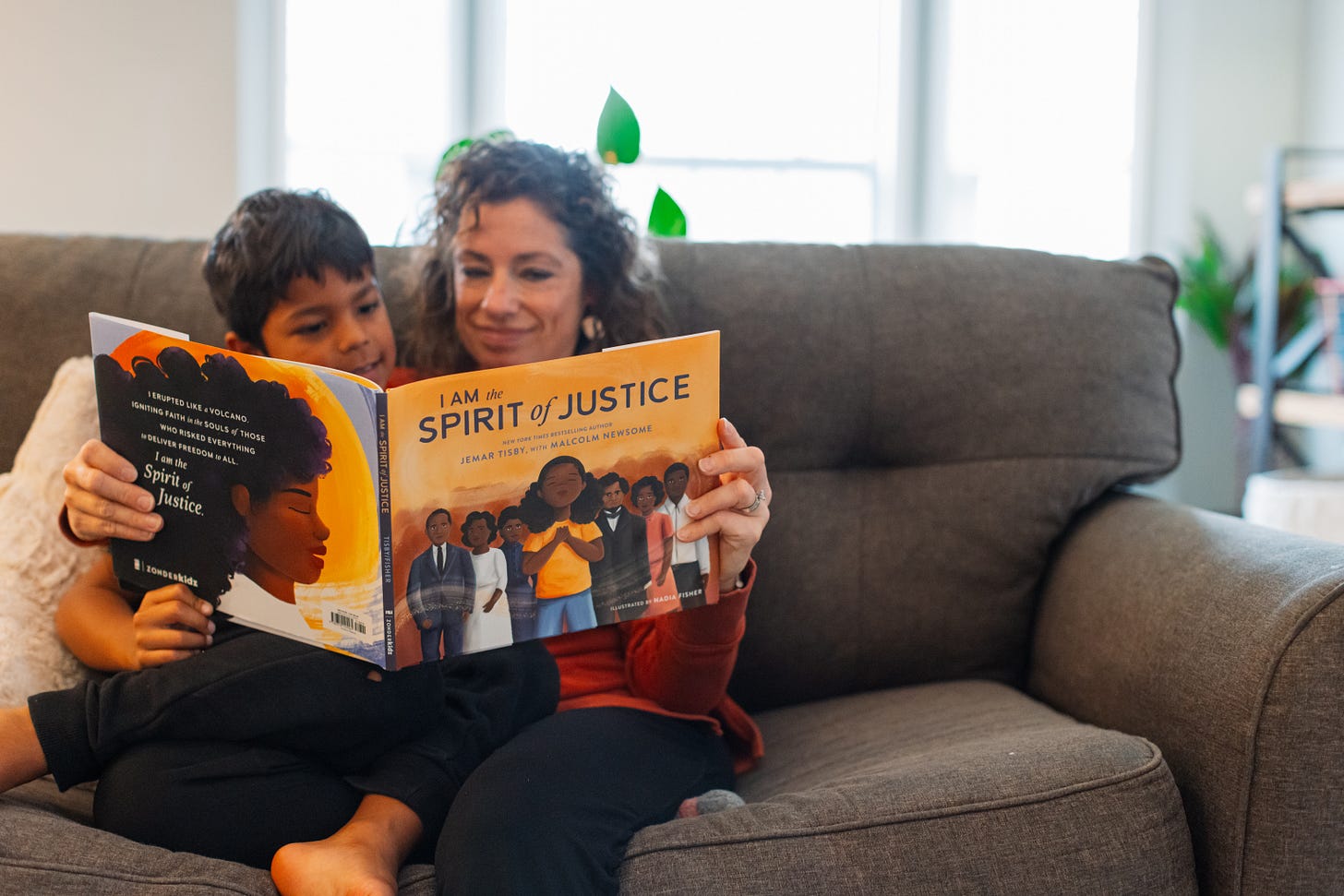"Homestead" Movie Review
How a faith-focused film reinforces nationalism, individualism, and fear of the “other.”
It’s time to break the generational cycle of racism and injustice. You start that process with you and the kids in your life today. Pre-order one or both of my upcoming children’s books.
Stories of the Spirit of Justice
I didn’t plan to see the movie Homestead.
Any adult can relate to reluctantly watching a movie, not because you want to, but because the kids in your life insisted.
My son is fascinated by post-apocalyptic dramas, and with the Christmas season in full swing, I caved to his request.
But I went in wary.
I saw that Angel Studios had produced the film, and I wondered how this faith-focused film company would convey its messages about religion and culture.
I didn’t have to wait beyond the first scene to find out.
It wasn’t a coincidence that brown-skinned men speaking a different language (Tagalog, I believe), were the ones who set off the nuclear bomb off the coast of Los Angeles that triggers the post-apocalyptic setting of the film.
Homestead is an Angel Studios production, the company known for mega-hits like The Chosen and Sound of Freedom.
Angel Studios is not sitting at the kids’ table in the film and TV space. With revenues climbing to $45 million in the first half of 2024 and plans to go public, the studio has become adept at weaving faith-focused themes into high-quality entertainment.
While their content has high production value, the studio’s alignment with a blend of conservative ideology and a particular type of Christianity had me skeptical.
As the movie unfolded, my initial unease proved well-founded.
Homestead reflects something deeper than creative storytelling. It reveals how media can shape public perception, embedding harmful ideologies and paranoia that resonate far beyond the screen.
The film paints a world where government intervention is a joke, communal uplift is scarce, and the wealthy take center stage rather than the desperate masses.
One government character, Blake Masterson, is a caricature of bureaucratic ineptitude.
He’s out to confiscate guns and food from a self-sufficient doomsday prepper compound, a not-so-subtle message about government overreach and the fragility of social support systems.
The context behind Homestead is as important as what’s on screen.
The film emerges in an era where fear of societal collapse drives real-world behaviors.
Various reports indicate that over half of Silicon Valley billionaires have purchased “apocalypse insurance,” ranging from remote properties to underground bunkers.
The film’s billionaire protagonist, Jeff Ross, and his fortress-like compound in the Rocky Mountains mirror this trend that portrays survival as a privilege of the ultra-wealthy while reinforcing the idea that collective solutions are untenable.
Homestead is more than a movie.
It’s part of a broader cultural project—alternatively implicit and explicit—that reinforces narratives that prioritize individualism, nationalism, and suspicion of “the other.”
These messages are particularly potent when delivered by Angel Studios, whose audience spans not just white evangelicals but people of color and international viewers attracted by the studio’s production quality and compelling storytelling.
Films like Homestead challenge us to think critically about the narratives we consume.
They raise a fundamental question: In the face of crisis, will we choose isolation and fear, or will we embrace shared humanity and mutual aid?
The stakes are higher than ever—not just on the screen but in our society.
I go into much more detail in this episode of Footnotes. Listen and let me know what you think!
Many of us grew up immersed in media that carried strong messages about faith, politics, and the end times. Looking back, how did those books, movies, or other media shape your worldview? Have your perspectives shifted since then? What triggered the shift?
Be sure to pre-order I Am the Spirit of Justice and Stories of the Spirit of Justice for the young people in your life!




Thank you for posting this. It will be another bellwether to identify Christian nationalists and sympathizers. These folks have descended into fictional propaganda like the 1915 KKK's "Birth of a Nation."
The Rise and Fall of Dispensationalism, by Daniel Hummel, put the final nail in the coffin for me, learning that this "end-times" theology was the brainchild of a 19th century Brit named Darby. I've written about how Darby's teaching, so readily seized upon by northern US church leaders as a means to heal the rift with their southern (white) counterparts, provided a detour around the hard work of lament/repentance and racial reconciliation.